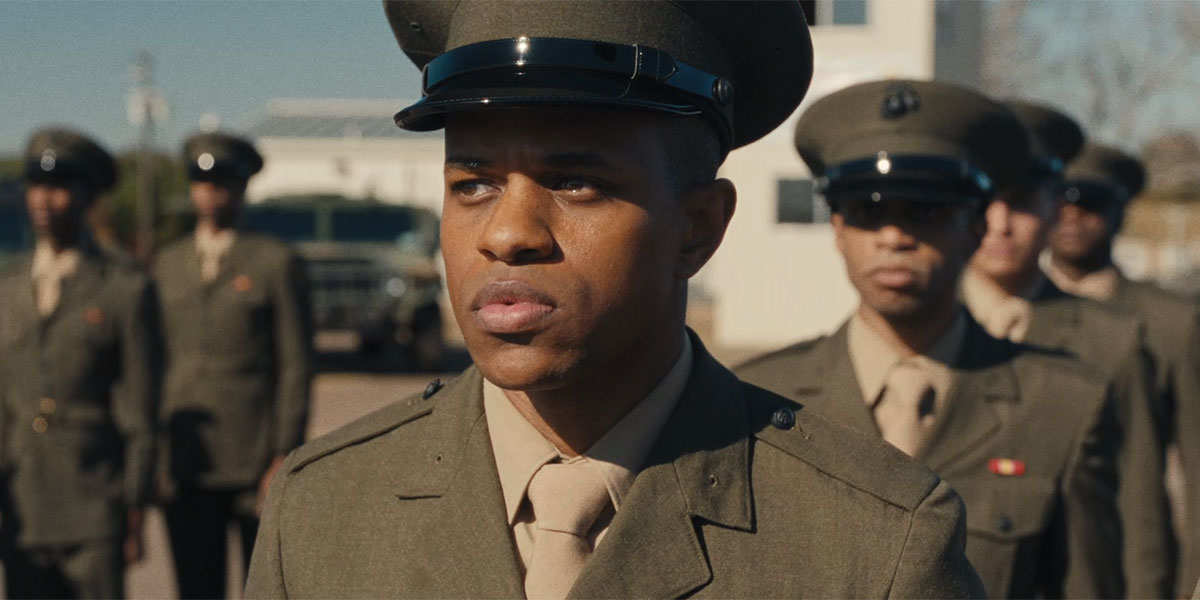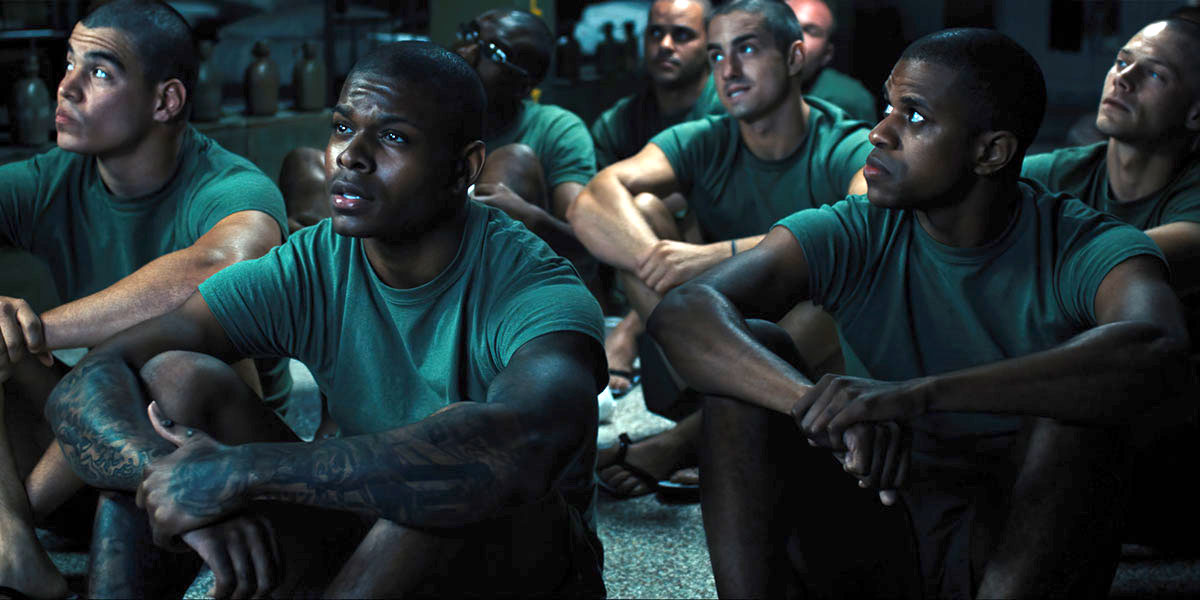Elegance Bratton’s queer military drama, The Inspection, favours emotion over action and sparsity over spectacle. The semi-autobiographical debut feature tells the story of Ellis French (Tony, Grammy and Emmy nominee Jeremy Pope), a Black gay homeless man who enlists in the United States Marine Corps at 25 to escape life on the streets. Desperate to avoid the fate of friends who are dead or in jail, he hopes to find purpose and win the approval of his Christian mother, who threw him out when he was 16.
The Inspection is not a war movie or an action flick, nor is it jingoistic. The 94-minute film doesn’t treat boot camp as a prelude to combat. It begins in a New Jersey homeless shelter and concludes with French’s graduation from the Parris Island training programme. French, like Bratton, joins the Marine Corps out of socio-economic desperation, not to defend his country, and finds dignity and self-worth as he confronts institutional and individual homophobia. He endures hazing, violence and the rigours of military training, emerging from boot camp as a fully realized Black gay man capable of kindness and compassion.
“We live in a culture where men are taught that forgiveness is a sign of weakness and we’re in this constant flow of cyclical male violence,” Bratton tells Xtra in a video interview. “I [learned to] draw my strength from forgiveness.”
Like Bratton, French is assigned to the Corps’ Combat Camera unit to be trained in film and photography—but his real triumph is not escaping homelessness, it’s embracing kindness and moving past trauma.
The Inspection is set in 2005 when “Don’t Ask, Don’t Tell” was still in effect, and the Iraq War was in full swing. The film touches upon these issues, but they inform the narrative rather than serving as its core. It is full of the usual military movie tropes from the sadistic drill sergeant Laws (Bokeem Woodbine) who wants to transform French into a killing machine to an understanding second-in-command, Rosales (Raúl Castillo), who serves as a reluctant mentor ; the fellow outsider Ismail (Erman Esfandi) who becomes a friend and Harvey, a recruit who is a rival and a bully (McCaul Lombardi). Bratton tells us enough about the members of French’s Marine unit to move the story forward and deftly delves deeper into their lives at critical moments as they reveal their traumas and motivations.
The zero-to-hero narrative is straightforward, following French through boot camp. Function trumps form, but it serves the story. After all, military training follows a clearly defined progression, breaking down individuals and moulding them into members of a cohesive unit. Bratton hints at who these men are while showing us who they are becoming. The minimal scaffolding in terms of character and narrative structure conveys the state of flux in which French and his fellow marines find themselves. They are in the process of establishing their boundaries as individuals while cohering into what amounts to a dysfunctional found family.
Pope shines as Ellis French, and delivers a restrained performance that renders French’s inevitable emotional and physical fireworks even more powerful when they appear. Gabrielle Union is equally effective as the icy mother, Inez, who loves but cannot accept her son.

Credit: Courtesy TIFF
The film is, at times, stagey, but again, to great effect. Truths are delivered as soliloquies in the wake of emotional explosions: French would rather die a hero in a uniform than “a faggot in the street.” Inez laments that having birthed Ellis at 16 without support, no one has ever asked what she wants. Laws muses about the failure of the Gulf War and whether he’s making Marines or monsters, and Rosales schools French on the history of gays in the military.
Bratton’s spare yet evocative vision is beautifully rendered by cinematographer Lachlan Milne who uses muted colours and close, often obstructed, views to re-create the stifling world of a military base. The ambient soundtrack by experimental pop outfit Animal Collective establishes a sense of otherness and echoes Vivian Vanessa Kubrick’s score for her father’s Full Metal Jacket (1987) and Thomas Newman’s musical contribution to Sam Mendes’s Jarhead (2005).
Like Bratton, French is assigned to the Corps’ Combat Camera unit to be trained in film and photography, but his real triumph is not escaping homelessness. It is embracing kindness and moving past trauma.
The monster predicted by Laws never materializes. In its stead, we see a young Black gay man who has emerged from the brutality of boot camp with a heightened sense of self-worth and compassion. He no longer seeks his mother’s approval, but counters her cruelty with kindness and an invitation to break the cycle of suffering.
It’s not the lesson you’d expect from a military movie, but The Inspection is not your typical soldier’s story. It is not a glorification of life in the Marines, but a powerful reflection on a young Black gay man carving a place in a system that does everything to reject and oppress him.
Xtra spoke to Bratton via Zoom during a visit to Toronto ahead of the Canadian release of The Inspection.
Could you tell us about the personal experiences that inspired The Inspection?
The Inspection is a personal story based on my own experience. At the age of 16, I was kicked out of my house for being gay and spent the next 10 years homeless. At 25, I ended up in a shelter, called my mom up and asked her if I could come back. She said, “No,” and I should join the military and straighten myself out. So, I joined the Marine Corps. I was against it because it was 2005, and the Iraq troop surge was happening. It felt like she was saying, “I’d rather you be blown up than be gay in my house.” The next morning, I was approached by a Marine recruiter. And I said to him, “If I can look half as good in that uniform as you do, please sign me up.”
I got to boot camp, feeling totally worthless, like my life had no meaning, value or purpose. I was fortunate enough to have a drill instructor say to me, “Hey, you know what? Your life does have value” and I ran with it from the homeless shelter to boot camp to this interview.
Was the Marine Corps your found family?
For sure. The Marine Corps was my found family. But there’s a caveat to that. Every family is dysfunctional. I found a certain type of camaraderie and brotherhood. But my name is Elegance. From before I could even know who I was, everyone assumed that I was Black and gay before I ever entered the room. And you know what? They were right.
I tried to do other things during those 10 years of being homeless. But Black gay people live in this kind of liminal space: a blind spot of a colour-blind, post-racial society that wants to wish racism away, while at the same time refusing to acknowledge the specificity of queer existence and desire. So, you end up navigating invisibility. When I joined the Marine Corps, I finally found a group of men who could not deny me and, as oppressive as the system of “Don’t Ask, Don’t Tell” was, I had access to a new set of opportunities that weren’t possible elsewhere.
In America, one out of two black gay men are projected to be HIV-positive in their lifetime. We’re eight times more likely to be homeless and eight times more likely to commit suicide. So, an early and unremarkable death is almost promised to you. But then, you put on a uniform, and your life and death have some sort of global, geopolitical importance. So, yes, I found my family in the Marines. However, families are complicated. [The Inspection] is not a pro- or anti-military film. It’s a pro-troop film and a pro-[Ellis] French film.
In the film, French is assigned to the documentary and camera division after boot camps. Is the Marine Corps where you learned filmmaking?
The first time I had an opportunity to use a motion-picture camera was in the Marine Corps. When I was homeless, one of my hustles was stealing books. I sold everything I could get my hands on to survive. Art books, in particular, had a very high resale value. So, I took an ASVAB [aptitude test] when I enlisted, and I scored very high, and my recruiter marked off the top three jobs in the military. The first job was intelligence. I’m not a snitch, so I couldn’t do that. The second job was journalism, but I’m too biased. The last job was filmmaking. And because I had a very distant understanding of what it meant from reading all these books that I’d stolen: Scorsese’s book, and Almodóvar’s book, I said, “Yeah, who doesn’t want to be a filmmaker?” So that’s how I got exposed to filmmaking.
What did you learn about masculinity in the Marines?
Boot camp is essentially a combination prison, summer camp and fraternity. Simone de Beauvoir says in The Second Sex that one is not born a woman, but one becomes a woman, and I believe the same thing to be true about becoming a man.
When I was an out gay man, most of the [male] spaces I’d been in were gay spaces. Whereas in the Marine Corps, it’s a homosocial space, and the intimacy that men form in those spaces is predicated on the notion that there is no sex here. And I was always tickled by how much in common these supposedly diametrically opposed spaces have.
Did you ever gain closure with your mother? And could you speak to the casting of Gabrielle Union as Inez French?
Unfortunately, my mom was killed a few days after the movie was greenlit, and she never got a chance to see the film. That’s why I’m so grateful to Gabrielle Union. She dove headfirst into my pain and my grief and made space for it on set. [My husband] Chester told me, “Don’t stuff it down. If you’re feeling it, you’re going to act it out because it’s so deeply personal to you. So let everybody know.” And when I let Gabby know, she wore my mother’s jewellery in this film, she read from my mother’s Bible and she is styled just like my mother.
My mother was the first person to ever love me completely. She was also the first person who rejected me wholly. She was a very complicated woman, and I am so grateful to Gabrielle Union for bringing my mother back to life so that I could have a chance at the closure my mother couldn’t provide me in her lifetime. But I did get the chance to tell her that I forgave her for all of it. And I’m grateful for that, as I am for Gabby embodying this character and helping to humanize her and expose her humanity. I pray that somebody who’s watching this, who might take their kid out for their sexuality, or their gender or whatever, will see Inez French in this film and think otherwise.
Jeremy Pope is riveting as Ellis. Can you speak to the casting of the lead?
It had to be Jeremy Pope, no one else. It had to be an out Black queer actor and a phenomenal talent as well. Growing up as a Black gay man, I never saw myself as the hero in films. I believe that people go to see movies to see themselves, and they want to see aspirational versions of themselves that inspire them to do better. Very often, Black queer people are handbags. They’re accessories in a film and speak to the development of the lead character, but they never develop on their own. I believe that our compromised position in society is reflected and related, if not justified, through our erasure in the cinema, and that has real-life consequences. People are walking around here thinking they don’t deserve to exist because they don’t see themselves anywhere.
Jeremy and I were talking about it on set. What would it have meant to us as teenagers to have a character like Ellis French? My identity as a Black gay man is a hodgepodge. It’s a little bit of Andy Warhol, a little bit of Tupac and some Beyoncé choreographies. Put it in a blender, and that’s who I am. We didn’t want people to do that algebra anymore. We wanted to create something for future generations where they could just go to the theatre—please go to the theatre and watch it—and enjoy seeing their own excellence.
I said from the beginning, “I do not want you to impersonate me, and you do not have to be me. Ellis French is our character now.” I wanted to make sure that Jeremy had space for his own journey as a Black queer man and to bring his experiences to the character. We created a safe space for one another where he could be a vessel that I could pour myself into. And vice versa.
What would you like audiences to take away from this film?
The Inspection is a film that will hopefully remind audiences that you can triumph over real adversity and that escapism is not the only way to overcome trauma. You can confront it and still win. That’s what this is about.
The Inspection premiered at the Toronto International Film Festival in September and is currently playing in Canada and the United States.


 Why you can trust Xtra
Why you can trust Xtra


